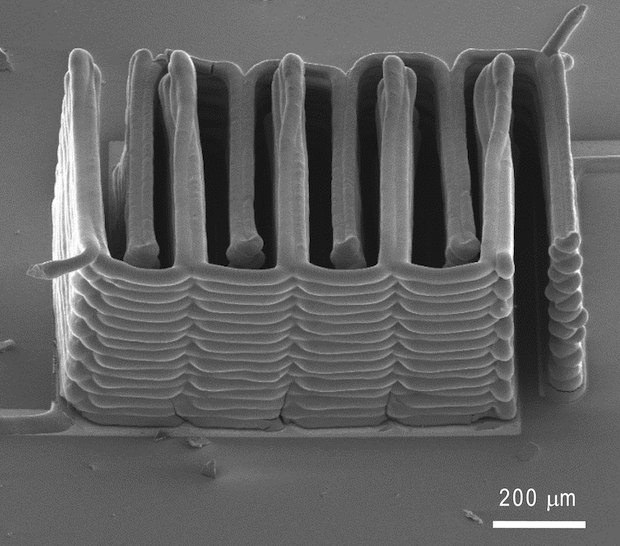
 Micro Li-ion battery (SEM view above) is manufactured using 3D printing to deposit anode and cathode materials (red and purple, respectively) on gold contacts. The stack is then encased and electrolyte solution is added. Credit: Ke Sun, Bok Yeop Ahn, Jennifer Lewis, Shen J. Dillon
Micro Li-ion battery (SEM view above) is manufactured using 3D printing to deposit anode and cathode materials (red and purple, respectively) on gold contacts. The stack is then encased and electrolyte solution is added. Credit: Ke Sun, Bok Yeop Ahn, Jennifer Lewis, Shen J. Dillon
Researchers from Harvard University’s Wyss Institute for Biologically Inspired Engineering and the University of Illinois at Urbana-Champaign are using 3D printing to create lithium-ion microbatteries about the size of a grain of sand.
“Not only did we demonstrate for the first time that we can 3D-print a battery, we demonstrated it in the most rigorous way,” Jennifer Lewis, senior author of the study and Hansjörg Wyss Professor of Biologically Inspired Engineering at the Harvard School of Engineering and Applied Sciences, said in a news release.
Researchers built the tiny battery using a custom-built 3D printer with a nozzle narrower than a human hair to layer anode and cathode materials on gold comb contacts. They then encased the electrodes and added electrolyte solution. The 3D printing process required development of inks with the right electrochemical and hardening properties. The anode and cathode inks, each incorporating nanoparticles of a different lithium metal oxide compound, were deposited with the process that can be viewed here.
The researchers then tested battery storage, power delivery, and charging properties. “The electrochemical performance is comparable to commercial batteries in terms of charge and discharge rate, cycle life and energy densities. We’re just able to achieve this on a much smaller scale,” coauthor Shen Dillon said.
Results of the work were published online in Advanced Materials (DOI:10.1002/adma.201301036). In addition to Lewis and Dillon, the paper’s authors included Ke Sun, graduate student in Materials Science and Engineering, University of Illinois at Urbana-Champaign; Teng-Sing Wei, graduate student at Harvard SEAS; Bok Yeop Ahn, Senior Research Scientist at the Wyss Institute and SEAS; and Jung Yoon Seo, visiting scientist from the Korea Advanced Institute of Science and Technology.
